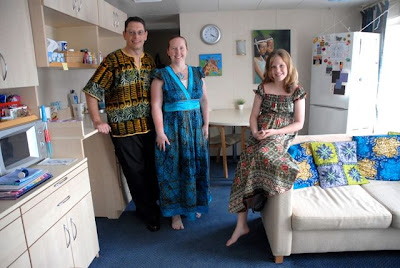VVF Dress Ceremony
From down the hall, the distant drums
start to beat as the voices begin to sing out in celebration. Onboard the Africa
Mercy, today is a day for celebration. Several women enter the hospital
ward with their hands raised in celebration. Each one is dressed in bright
fabric with fancy head-wraps and new jewelry. They each wear makeup, some for
the first time in their lives. Today’s celebration is for them . . . because
they have been healed.
The women are all part of the Mercy
Ships VVF program. VVF is an injury caused by obstructed labor. It causes a
woman to continually leak urine, feces, or both. Sadly, these women are often
shunned from society because of the smell resulting from their incontinence. In
their culture, it is commonly believed that the physical problem is the result
of a curse or a sin. Many of the women lose their husbands and families. They
are completely cut off from society – alone and in despair.
In reality, the biggest cause for VVF
is a lack of access to emergency obstetric care. When labor becomes
complicated, a woman is left to suffer for days as the unborn child continues
to push down on the mother’s pelvis.
Dr. Lauri Romanzi, a VVF surgeon,
says, “It is a completely preventable condition that can be eradicated from the
world. It takes prevention.” That prevention is access to health care,
something that is not available in third world countries like Togo, West
Africa. In the western world, if the labor becomes obstructed, the mother is
rushed into surgery for a caesarian section. “In the United States, the
percentage of births that perform a caesarian is over 30%,” Dr. Romanzi
explains. “This eradicable epidemic is a problem merely because these women do
not have access to emergency caesarian sections.”
This is why VVF awareness is important
– because it is a condition that could affect any woman in the world, but, with
proper health care, it is preventable. The women share the emotional pain
caused by their physical condition. “If their voice is crying out for one
thing, it would be to be normal again,” Dr. Romanzi says, fighting back her own
tears in her passionate concern for these women.
As the women stand up to give their testimonies,
emotions are clearly written on their faces. Chins quiver and words fail them
as they try to thank Mercy Ships for saving them from a life of anguish. Today
marks a new day! Their strength and perseverance have finally carried them to
the end of their suffering, and now they can let go of the past. It means they
have the prospect of starting over and re-entering society. It is the start of
a new life with delightful possibilities.
Each patient is given a Bible and
parting words of encouragement. Joy wipes away their tears, and they dance out
of the ward as they sing – a song of happiness, healing, and triumph that rings
throughout the halls of the hospital. Each woman leaves the ship with her head
held high in new-found confidence. It is her new beginning!
 |
The VVF patients dance into the ward wearing brightly coloured dresses, jewelry, and makeup. |
 |
Each woman gives her testimony. |
 |
After giving their testimonies, they sing out their song of joy for all to hear. |
 |
There is a lot of dancing at a Dress Ceremony. |
 |
Each patient is given a Bible and encouraging words from the staff. |
 |
With last hugs of joy, the patients thank those who helped them. |
 |
After the celebration ends, the women leave the ward – still singing and dancing. |
 |
Group pictures are taken. |
 |
|
 |
|
 |
|
 |
|
 |
|
 |
Written by Nicole Pribbernow
Edited by Nancy Predaina
Photos by Debra
Bell
I was so excited to hear about the VVF Dress Ceremony! I had known about it for years and had heard of the jubilation off these women whose lives had been restored. I had to see it for myself! I was overwhelmed by the women's stunning dresses and the beauty that shone from within them. As we sang praises to God the women raised their hands, giving glory to the one who had supplied a gifted surgeon to heal heir broken bodies. Now they could walk through their villages with their heads held high. No longer rejected but celebrated!
We heard the beat of the drums and the triumphant procession all the way down the hospital corridor. There is something about the sound of a djembe that is completely hypnotising and joyful. The women entered the ward looking glorious. We launched into song, some French worships songs and one of my favourite and most well known West Africa worship songs, "Great Things He has Done". Surely he has done great things! As each of the women gave their testimonies, with the help of four translators, there was barely a dry eye in the house. At last I had seen the amazing dress ceremony and it was so worth the wait!
|
























































